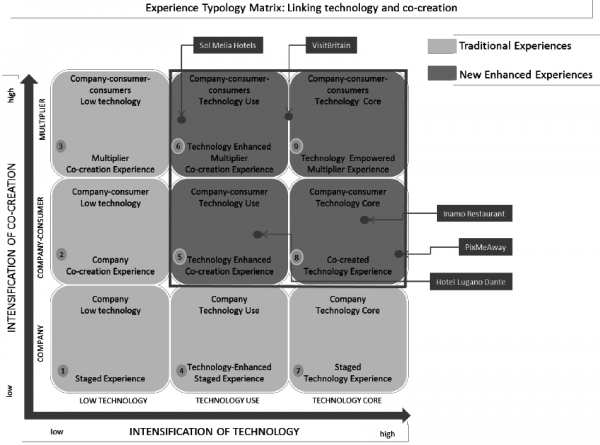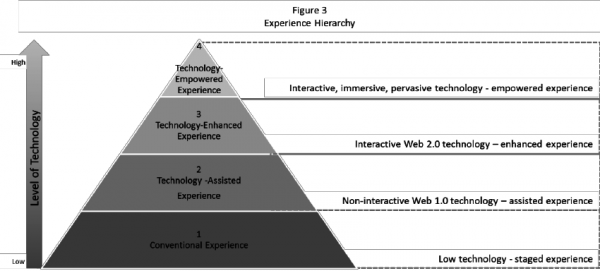REACTION PAPER FOR THE ARTICLE
“A Typology of Technology-Enhanced Tourism Experiences”
Published on the International Journal of Tourism Research
Authors:
Barbara Neuhofer ( Fachhochschule Salzburg )
Dimitrios Buhalis ( Bournemouth University )
Adele Ladkin ( Bournemouth University )
If you press here you can also download the article yourself.
What is the article about ?
The aim of the article I choose to reflect about is to fill the gap between the findings of tourism literature about the impact of information and communication technologies on experiences and the lack of case study about it, exploring five companies cases in an half-day workshop in London, UK.
I choose this article firstly because I think it can be relevant for this study unit since we’ll learn how to improve the digital marketing thanks to the new technologies and their huge impact to boost also a small business if used in the right way. The second reason is that tourism involves a communication around the globe, connecting people and raise their awareness about a tourist destination. Technology has a big power on this field, thinking in particular to the impact of social networks, able to make a destination attractive or not, also through costumer’s reviews. The article underlines also how tourists can live authentic experiences with their mobile devices and attach personal meaning to them.
I choose to reflect about this article because of of a phrase that underlines how tourism as a service-intense industry has gone for many decades hand in hand with technology and embraced the potential inherent in its latest developments, revolutionised the way travel is planned, business is conducted and tourism services and experiences are created and consumed.
The findings from the study show two different types of roles of technologies for experience enhancement: the first one is to support the tourism experience, based on the personal choice of the customers, the second consist in being the central part of the experience, becoming the experience itself.
Technology and co-creation
One of the main focus of the article is the find the link between technology and co-creation showing how these two parameters are strongly connected, since when the co-creation and the use of the technology parameters are higher, the tourism experience is enhanced.
The findings and analyses of the workshops showed how this leads to more personalised interactions, more valuable service encounters and on overall enhanced experience for the guest.
The following image show how the company that represents the highest intense experience on both levels of technology and co-creation is Visit Britain.
How they create this enhanced experience?
Building a stronger relationship not only between companies and customers but also customer-to-customer, creating a network where people are enchase in all the phases: pre-, during- and post-travel. They developed an application called Top 50 UK Places where visitors were encouraged to create content in terms of photography and videos and share them with others through the LoveUK Flickr and Facebook platforms, making possible to see the destination from the eyes of the tourists themselves.

I personally think this is because the main field where we see the connection between technology and co-creation is, without a doubt, the social networks one. Tourist and costumers, thanks to their mobile devices, usually share what they liked most from an experience or what they found more beautiful and attractive. This behavior can help a lot companies understanding what the costumer prefer and this leads to a process of co-creation between these two actors.
Technology and conventional experiences
The authors of the article also design a piramid to visualize and express how a low level of technology correspond to a more conventional experience, while increase the amount of technology can lead to an interactive, immersive and pervasive experience.

Conclusions:
Technology has allowed us to move more independently in a tourist destination. For example we can book our holiday without travel agencies anymore. Website can help us find flight and accommodations, applications as Google Maps help us to orient ourself without a guide, and review website like Tripadvisor can help us autonomous find the best activity to try or restaurants where to have lunch.
This had an huge impact and gives us a completely different experience compared to the one we can have with all inclusive package deals offer by travel companies. The positive effects are that such travels are cheaper and we can personalize it, with also last minute change. Even if these type of holiday can be stressful and rich of unexpected events. Also because the costumer must be very careful in the sites he books the experiences. Very cheap prices can hide a fraud and not everybody is able to recognize it.
This article at the end made me reflect also about how important is to line a border with the use of technology. We are surrounded and overwhelmed by it everyday and and many studies show how a digital free tourism can have a positive impact on physical and mental wellbeing. For example exploring participants’ motivations for voluntarily abstaining from, or limiting their use of, technology on their travels. ( Egger, I., Lei, S. I., Wassler, P., 2020. Digital free tourism – An exploratory study of tourist motivations. ).
This is something we definitely need to keep our eyes on…
Bibliography:
Neuhofer, B., Buhalis, D., Ladkin, A., 2013. A Typology of Technology-Enhanced Tourism Experiences. DOI: 10.1002/jtr.1958.
Egger, I., Lei, S. I., Wassler, P., 2020. Digital free tourism – An exploratory study of tourist motivations.
Buhalis D. 2003. eTourism: Information technology for strategic tourism management. Harlow, UK: Prentice Hall.
Buhalis D, Licata M C. 2002. The future eTourism intermediaries. Tourism Management 23(3): 207– 220.
Stamboulis Y, Skayannis P. 2003. Innovation strategies and technology for experience-based tourism. Tourism Management 24(1): 35–43.